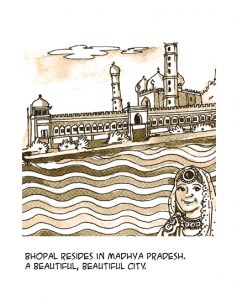
Over the next eight days we’ll be serialising a comic strip drawn by a young woman from Bhopal. Her name is Kokila and she has thrown herself in to the campaign, producing some really excellent work. Kokila is from the new part of Bhopal where the disaster was less severe and where many might prefer to forget the terrible tragedy that befell their city. Kokila’s work, and especially efforts to mobilise the young people of New Bhopal, are of vital importance since, if we are to maintain the strength of the Bhopal campaign, we must continually tell the story to new audiences. We must continue to explain that ‘#WeAllLiveInBhopal’
Please follow the serialised strip on our Facebook page: CLICK
In Kokila’s own words;
“I was born & brought up in Bhopal. While the Dow-Carbide disaster starts in 1984, it goes way back since human greed figured they could make profits at the cost of human lives. And for me it started in school while I was busy telling people to switch to CFLs, use public transport, take shorter showers, use grey water & ‘save the planet’. Some kind person told me to contact Sathyu & learn about the aftermath of the disaster. A lot of my life changed after that. I, humbly backed by friends, managed to do two major events talking about the current scenario & the little things we can do.We were mocked & discouraged because it was a torn-out, old issue. We would be told to stop our ‘Bhopali bachche (kids) nonsense’.
This pushes people like me harder.
This ignorance towards your own city reflects largely on how you perceive the world. I happened to write & illustrate a book when college started. After dropping out I decided to make sure my generation understands two things. One, most luxuries that we enjoy are the flip-side of someone facing the brunt at the lowest level of social hierarchy, ( in this case, the clouded slums in ‘Old Bhopal’) and two, turning away wont label Bhopal as an isolated event that cannot or is not recurring.
And it was primarily the Bhopal case that led to read, understand & agitate corporate culture, consumerism & capitalism.
After many more of these events I cannot measure what the impact could be. The book, “Eyes Wide Shut” could not be published so we exhibited the artworks last year. Art cannot upturn things but can be an instrument to unroll information effectively. I came back to Bhopal to work with the Remember Bhopal museum, which now is a guardian to all memories of the survivors. The role of these narratives will shape what kind of world we choose tomorrow. These voices, from the Bhopal campaign, come from a larger threat, a bigger purpose. A mere reminder that corporations & government, for that matter, were created for people. It is of little consequence how much the company would suffer or how would it matter. If one signature, sometimes a word, and even one conversation, has, infact affected hundreds of lives, imagine what justice could do. Imagine what ‘accountablity’ could mean to the world’s biggest industrial disaster.”


